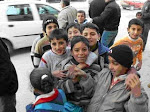"What's the purpose of your trip to Israel?" was the question asked by six different Israeli security officials of Sarah* and On Earth Peace executive director Bob Gross this past weekend, in the course of more than twelve hours in the custody of Israeli airport security.
Eventually, Bob and Sarah were denied entry, jailed and deported from
Israel—barred from re-entry for ten years.
On Tuesday, they arrived back in the United States, instead of meeting with thirteen others arriving in Israel for a peacemaking delegation which the two were supposed to lead in Israel and Palestine, January 6-18.
What was the purpose of their trip to Israel? This fifth annual Middle East delegation co-sponsored by On Earth Peace and Christian Peacemaker Teams is an immersion in the realities of the current moment in the Israeli-Palestinian conflict. What are those realities? A nonviolent movement is on the rise, again; this week, over a thousand international activists attempted to enter into Gaza from Egypt, bearing humanitarian and medical aid. A separation wall continues to be built by Israel, dividing Palestinian families and communities and taking Palestinian land. Israelis live in fear of suicide bombers. Many Palestinians who live under blockade and military occupation continue eking out daily life without access to safe water, medical care, or basic foods. Some Israelis and Palestinians who are weary of decades of bloody conflict are creating nonviolent pathways to resolving the situation.
The remaining thirteen members of the delegation entered Israel without incident. The peacemaker delegation, including seven members of the Church of the Brethren, will visit with Israeli and Palestinian peace, social justice and human rights groups, and will be hosted by families and community leaders. From these visits and meetings, delegation members will learn gain an understanding of Palestinian and Israeli perspectives and concerns. Delegate Shannon Richmond of Seattle, WA, is a recent college graduate in criminal justice and violence studies, who has spent time traveling in South Africa and Mexico. In the days before leaving, she said, “I am anxious to see how nonviolent action works in real-life circumstances, rather than just reading about it!” Upon returning to their home communities, delegates will be prepared to speak of what they have learned and experienced first-hand.
Back home in North Manchester, Indiana, Bob Gross reflected on the interrogation and deportation experience. “During our time being held with Israeli security, we saw many other people coming under additional questioning as well. Almost all those pulled aside were people of color. Most were of Arab and African descent. We’re clear that Sarah’s Egyptian heritage as well as her photographic documentation of Palestine via the internet were motivating factors in their decision to deport us. In addition to this racism, there is also the Israeli government’s fear of anything that seems to value Palestinian equality or human rights, which means that those of us who are committed to nonviolent peacemaking are considered a threat.”
Supporting that struggle – for Palestinian rights as well as Israeli rights, for safety, equality and security for all people in the Middle East – is the real purpose of the On Earth Peace delegation this month, and of Bob and Sarah’s aborted entry into Israel.
*Sarah’s last name is kept confidential to protect her from further scrutiny on subsequent trips to the Middle East.
###
On Earth Peace provides skills, support, and a spiritual foundation to face violence with active nonviolence, through ministries of education, reconciliation, and community organizing. On Earth Peace is rooted in the Church of the Brethren, an historic peace church in the Anabaptist and Pietist traditions, with a three-hundred year commitment to radical discipleship, service and peacemaking.
www.onearthpeace.org




